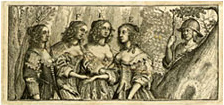Edward Winslow, Good News from New England (1624)
Full Text
Not available
EEBO/TCP
Not available
Date
1624
Author
Edward Winslow Note: 15/10/2005
Book title
Good Newes from New-England: Or a true Relation of things very remarkable at the Plantation of Plimoth in New-England. Shewing the wondrous providence and goodnes of God, in their preservation and continuance, being delivered from many apparant deaths and dangers. Together with a Relation of such religious and civill Lawes and Customes, as are in practise amongst the Indians, adjoyning to them at this day. As also what Commodities are there to be raysed for the maintenance of that and other Plantations in the said Country
Publication place
London
Printer
I.D.
Publisher
William Bladen and John Bellamie
Transcription source
EEBO/TCP transcript
Text type
printed book
Genre
Treatises
Subject area
- Algonkian
- travel
Summary
Incidental terms and their Englishing occur in the narration
Language
headwords: Algonquin
explanations: English
explanations: English
explanations: English
explanations: English
Word-group
type: alphabetical
Word-entry
type: headword
sample: For as they conceiue of many divine powers, so of one whom they call Kichtan, to be the principall and maker of all the rest, and to be made by none: He (they say) created the heavens, earth, sea, and all creatures contained therein. Also that he made one man and one woman, of whom they and wee and all mankinde came: but how they became so farre dispersed that know they not. At first they say, there was no Sachim, or King, but Kichtan, who dwelleth aboue in the Heavens, whither all good men goe when they die, to see their friends, and haue their fill of all things: This his habitation lyeth farre West-ward in the heauens, they say; thither the bad men goe also, and knocke at his doore, but he bids them Quatchet, that is to say, Walke abroad, for there is no place for such; so that they wander in restles want and penury: Neuer man saw this Kichtan; onely old men tell them of him, and bid them tell their children, yea, to charge them to teach their posterities the same, and lay the like charge vpon them. (pp. 52-53)
sample: For as they conceiue of many divine powers, so of one whom they call Kichtan, to be the principall and maker of all the rest, and to be made by none: He (they say) created the heavens, earth, sea, and all creatures contained therein. Also that he made one man and one woman, of whom they and wee and all mankinde came: but how they became so farre dispersed that know they not. At first they say, there was no Sachim, or King, but Kichtan, who dwelleth aboue in the Heavens, whither all good men goe when they die, to see their friends, and haue their fill of all things: This his habitation lyeth farre West-ward in the heauens, they say; thither the bad men goe also, and knocke at his doore, but he bids them Quatchet, that is to say, Walke abroad, for there is no place for such; so that they wander in restles want and penury: Neuer man saw this Kichtan; onely old men tell them of him, and bid them tell their children, yea, to charge them to teach their posterities the same, and lay the like charge vpon them. (pp. 52-53)
STC
25855-56
Other editions
1648: Wing G1062




